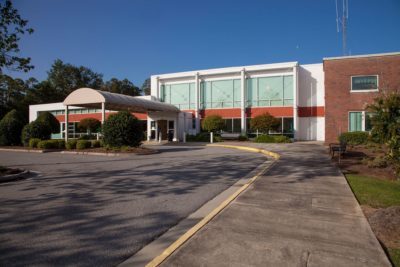“It feels like it just doesn’t end.’’
That’s how Damien Scott, CEO of Emanuel Medical Center in rural southeast Georgia, described the current covid wave and its impact on his hospital and community.

All six ICU beds at the Swainsboro hospital Tuesday morning were filled with very sick virus patients, with five on ventilators. Several more people were waiting in the emergency room for beds or were being treated in the ER. Transferring patients to other hospitals isn’t possible because there’s nowhere for them to go right now, Scott said.
Some members of the hospital staff ‘‘have been working for 12 days straight’’ because about a dozen of their colleagues are out sick with covid, he added. Three of the ailing staff members were themselves patients in the hospital last week.
“I don’t think what we’re doing is sustainable,’’ Scott said.
A New York Times listing of the nation’s county hot spots Tuesday shows that of the 20 counties with the highest per capita infection rates over the past seven days, 19 are in the South.
Nine of them are in rural Georgia, in the southern and eastern parts of the state. Emanuel County is one of them.
The county’s vaccination rate is 29 percent, according to state Public Health data. That’s lower than the state average of 42 percent.
None of the recent ICU patients were people who had been vaccinated, Scott said. The hospital’s staff vaccination rate is 67 percent, and at the nursing home, nearly all employees are vaccinated.
Emanuel County needs help in setting up a covid testing unit, and the hospital is requesting temporary medical staffing from the state to help handle the patient load, Scott said.
The other eight Georgia counties designated as hot spots on the Times list are Cook, at No. 1, Pierce, Berrien, McIntosh, Brantley, Glynn, Emanuel, Tift and Lanier.
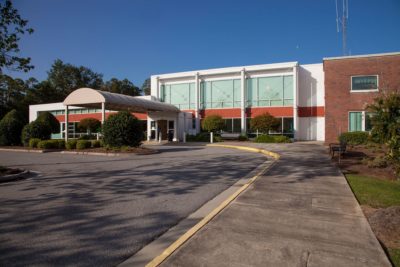
Low vaccination rates
In Cook County, Dr. Thomas Fausett, a family medicine physician, attributed the covid surge there to the “large portion of the population staying unvaccinated after a tragic year of sickness and death.’’
The county vaccination rate is 32 percent, below the state average of 42 percent.
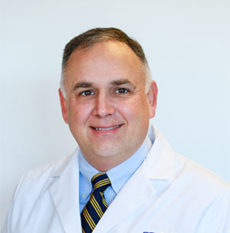
Masks in schools would have mitigated the spread of the virus, Fausett added.
“Now children are spreading it to each other and taking it home to parents and grandparents who are at higher risk of severe illness, hospitalization and death. This is now taxing health care workers to an extreme,’’ he said.
Several of the nine hot spot South Georgia counties have school districts that have adjusted their in-class schedules due to covid. According to their websites, the school systems generally require the wearing of masks aboard buses, while recommending masks but not requiring them in other settings.
“We’re drowning in patients,’’ said Dr. Flavia Rossi, a Tift County pediatrician.
“It’s getting worse and worse,’’ she said. “We’re exhausted.’’

Rossi noted that students attending class in Tift County are not required to wear masks, and she said social distancing guidelines aren’t being followed. The county vaccination rate is 32 percent.
About half of the children being seen at her Tifton office have covid or are suspected to have it, Rossi said. “Lots are babies,’’ she added.
Military teams called in
Gov. Brian Kemp announced Tuesday that the Georgia National Guard will deploy 105 personnel to hospitals throughout the state. The trained medical personnel will assist staffers at hospitals in Brunswick, Gainesville, Marietta, Atlanta, Albany, Stockbridge, Savannah, Macon, Fayetteville and Warner Robins.
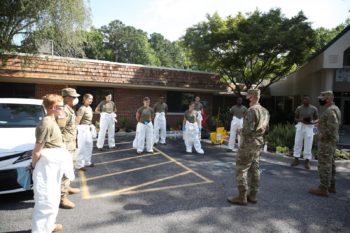
“These Guardsmen will assist our frontline health care workers as they provide quality medical care during the current increase in cases and hospitalizations, and I greatly appreciate General [Thomas] Carden and his team for their willingness to answer the call again in our fight against COVID-19,” the governor said in a statement.
At Southwell health system, based in Tifton, 86 patients had covid as of Tuesday morning, said Jay Carmichael, an administrator.
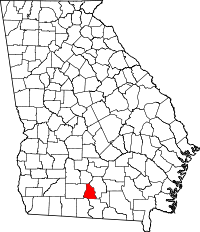
The Tifton hospital has 30 patients with various medical conditions in the ER, waiting for a bed. More than 50 staff members at the system’s Tifton and Adel hospitals have covid or were exposed to the virus, said Carmichael.
“All of our folks are worn out and tired,’’ he said. “We are getting slammed.’’
Kenneth Lowery, an epidemiologist for the South Georgia health district, said there was much more emphasis on masks and social distancing last year than there is now. “This summer, the mitigation strategies were relaxed.’’
Dr. Harry Heiman, a public health expert at Georgia State University, said the South’s high infection rates are linked to low vaccination rates and the absence of policies, like indoor mask mandates, that help to protect people and reduce community spread.
“Unfortunately, our political and public health leadership failed to heed the warnings, and we are now collectively paying the price in surging cases, hospitalizations and deaths in Georgia and across the region.’’

